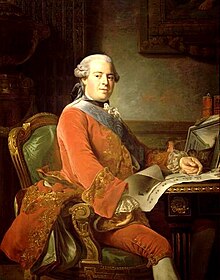Marquis de Marigny
| Abel-François Poisson de Vandières | |
|---|---|

The marquis de Marigny. Portrait by Alexander Roslin, 1764. Château de Versailles.
|
|
| Directeur-général, Bâtiments du Roi | |
|
In office 1751–1773 |
|
| Preceded by | Charles François Paul Le Normant de Tournehem |
| Succeeded by | Joseph Marie Terray |
| Personal details | |
| Born | 1727 Paris |
| Died | 12 May 1781 Paris |
| Religion | Church of France |
Abel-François Poisson de Vandières, marquis de Marigny and marquis de Menars (1727 – 12 May 1781), often referred to simply as marquis de Marigny, was a French nobleman who served as the director general of the King's Buildings. He was the brother of King Louis XV's influential mistress Madame de Pompadour.
Non-noble by birth, Abel-François Poisson de Vandières was raised in a family of Parisian financiers. When his elder sister, Jeanne-Antoinette Poisson became, in 1745, the official mistress of Louis XV and was given the title "marquise de Pompadour", she had him follow her to the court, where the young man attracted the favours of the king. When Philibert Orry retired, the king arranged for Abel-François Poisson de Vandières - then aged 18 - to inherit the direction of the Bâtiments du Roi ("direction générale des Bâtiments, Arts, Jardins et Manufactures"), while Charles François Paul Le Normant de Tournehem, believed to be the marquise de Pompadour's biological father, was named as Orry's immediate successor.
Charles Antoine Coypel, first painter to the king, was given the responsibility of training and educating the young Abel-François Poisson de Vandières. With Coypel's help, Poisson de Vandières chose paintings from the royal collection for exhibition at the Palais du Luxembourg, thus creating the first museum in France.
Between December 1749 and September 1751, he spent twenty-five months in Italy, staying first at the Académie de France à Rome, and then travelling (the so-called "Grand Tour") across the country with the engraver Charles Nicolas Cochin, the architect Jacques-Germain Soufflot and the abbé Leblanc. This trip would have important repercussions on the development of arts and artistic taste in France.
...
Wikipedia
